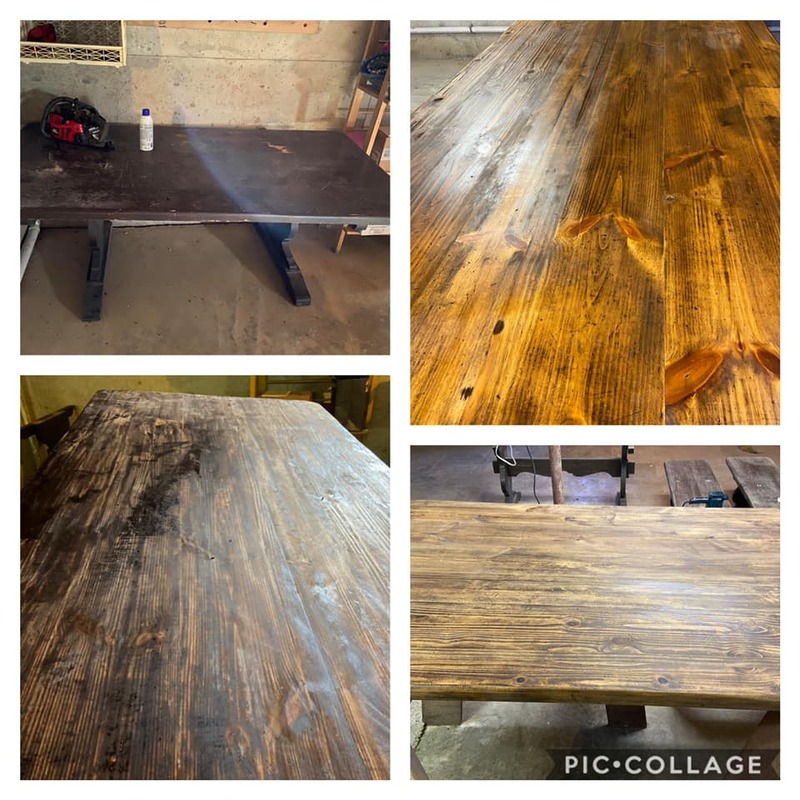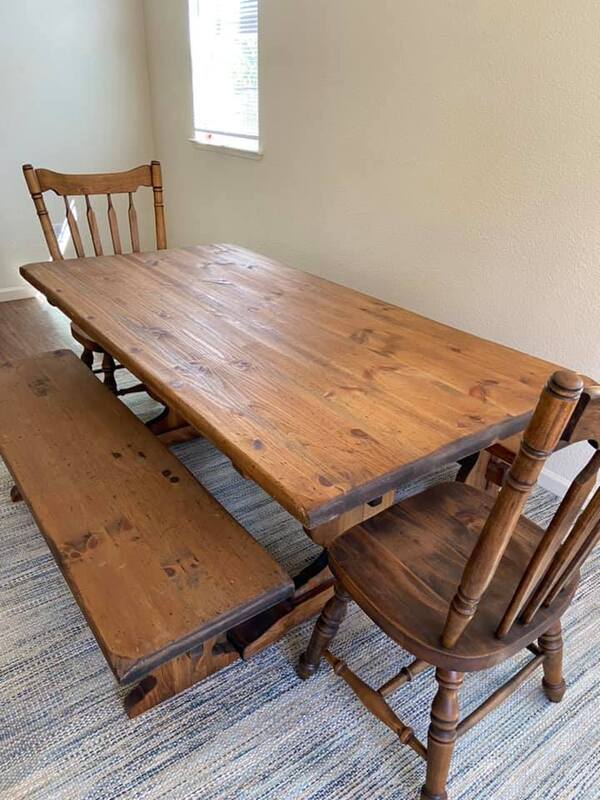Item
Time to Complete a Decade-Old Project
Title (Dublin Core)
Time to Complete a Decade-Old Project
Description (Dublin Core)
We had just moved from Fort Bragg (Fayetteville), North Carolina, to Eglin Air Force Base (Destin), Florida, when my husband learned he was deploying to Afghanistan this past January. Usually, when my husband deploys, I have work to occupy my time, but I did not find a teaching job when we moved. I decided to return to my hometown of Kane, Pennsylvania during my husband’s deployment. When the pandemic started, I decided to fix up a one-hundred-year-old table left in my sister’s house by the previous owner. I made my sister keep this table in her basement for ten years, with the promise that one day I would take it with me. It only took a deployment and a pandemic to get me started on this project. I figured working on the table would be an excellent way to pass the time since I could no longer visit old friends due to the pandemic.
I started working on the table in my sister’s basement armed with paint scrapers, wire brushes, CitriStrip, Mineral Spirits, and an acrid-smelling varnish remover. CitriStrip smells like oranges, and that is not a bad smell to have to permeate your sister’s house for days; however, the other varnish remover was not as nose-friendly. It smelt so bad that one could say that I was using biological terrorism on my family. Imagine ten thousand girls removing their nail polish at the same time with acetone, and you have some idea of the smell. It did not take long for my sister to kick me out of my (almost warm) basement work area, and I began to work on the table in the frigid temperatures of my parent’s garage where the smell of chemicals would not reach inside. Pennsylvania is not very warm in March, and I could never get warm, especially when I was using acetone. Acetone evaporates quickly, and as a result, it kept my hands cold. Also, I found that the acetone melted my latex gloves, and that made matters worse. My hands were always dry.
Removing the old varnish was laborious, and I am still not sure if it was varnish that coated the table. Research led me to believe that it might be shellac or a type of wax, and when I scraped the layers off, everything turned into a goopy mess. As I scraped each layer of the varnish off the table, I could begin to see more of the table’s features. I began to see the scorch marks from the saw, a mark where the previous owner left a paint can, and I could see the beautiful wood hiding underneath. Finally, it was time to sand. When you are sanding wood, you start with large grain sandpaper, and you work your way to finer sandpaper. I used both an electric sander and a hand sander. The electric sander made my hands numb, but the hand sander was time-consuming. As I wiped the sawdust away from the table, I felt accomplished. Now the table is a treasured part of our new home in Monterey CA; in fact, I am writing this paper on it right now.
*This is the story of someone finally getting around to refurbishing an old table.
I started working on the table in my sister’s basement armed with paint scrapers, wire brushes, CitriStrip, Mineral Spirits, and an acrid-smelling varnish remover. CitriStrip smells like oranges, and that is not a bad smell to have to permeate your sister’s house for days; however, the other varnish remover was not as nose-friendly. It smelt so bad that one could say that I was using biological terrorism on my family. Imagine ten thousand girls removing their nail polish at the same time with acetone, and you have some idea of the smell. It did not take long for my sister to kick me out of my (almost warm) basement work area, and I began to work on the table in the frigid temperatures of my parent’s garage where the smell of chemicals would not reach inside. Pennsylvania is not very warm in March, and I could never get warm, especially when I was using acetone. Acetone evaporates quickly, and as a result, it kept my hands cold. Also, I found that the acetone melted my latex gloves, and that made matters worse. My hands were always dry.
Removing the old varnish was laborious, and I am still not sure if it was varnish that coated the table. Research led me to believe that it might be shellac or a type of wax, and when I scraped the layers off, everything turned into a goopy mess. As I scraped each layer of the varnish off the table, I could begin to see more of the table’s features. I began to see the scorch marks from the saw, a mark where the previous owner left a paint can, and I could see the beautiful wood hiding underneath. Finally, it was time to sand. When you are sanding wood, you start with large grain sandpaper, and you work your way to finer sandpaper. I used both an electric sander and a hand sander. The electric sander made my hands numb, but the hand sander was time-consuming. As I wiped the sawdust away from the table, I felt accomplished. Now the table is a treasured part of our new home in Monterey CA; in fact, I am writing this paper on it right now.
*This is the story of someone finally getting around to refurbishing an old table.
Date (Dublin Core)
Creator (Dublin Core)
Contributor (Dublin Core)
Event Identifier (Dublin Core)
Partner (Dublin Core)
Type (Dublin Core)
text story
Controlled Vocabulary (Dublin Core)
Curator's Tags (Omeka Classic)
Contributor's Tags (a true folksonomy) (Friend of a Friend)
Collection (Dublin Core)
Linked Data (Dublin Core)
Date Submitted (Dublin Core)
10/13/2020
Date Modified (Dublin Core)
10/14/2020
07/20/2021
This item was submitted on October 13, 2020 by Caitlin Cannella-Martin using the form “Share Your Story” on the site “A Journal of the Plague Year”: https://covid-19archive.org/s/archive
Click here to view the collected data.


